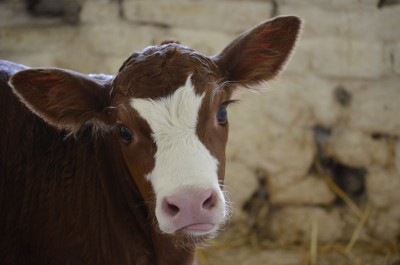New COVID-19 Resources and Guidance for Farm Workers
Alycia Drwencke, Dairy Management Specialist
Southwest New York Dairy, Livestock and Field Crops Program

New COVID-19 Video in Spanish (English subtitles): Show your employees!
Farms with Spanish-speaking employees need to share this awesome new COVID-19 video with your employees. Find it here on YouTube: https://youtu.be/W-BIhll_kkw. The video has clear and easy to understand directions for stopping the spread of the coronavirus. Click the "CC" icon at the bottom of the YouTube video to turn on the English text.
It was produced by:
- Libby Eiholzer of Cornell Cooperative Extension
- Lisa Ford of Cayuga Marketing
- Anna Meyerhoff, of NY Center for Agricultural Medicine and Health (NYCAMH)
Pair this resource with the written documents we produced earlier this week. A new resource to help Spanish- and English-speaking farm employees access credible, multi-lingual information about COVID-19 that they can use right away. The document appears in English and Spanish and the content is the same, we will keep both documents up to date during the present COVID-19 crisis.
- COVID-19 Reliable Resources for Farmworkers - Spanish
- COVID-19 Reliable Resources for Farmworkers - English
Farms care about keeping employees, communities, and consumers safe! Keep up the good work and we'll get through this together!
--------
New CDC Guidance for Workers Exposed to COVID-19; Recorded Webinar for Produce Farms: Dairy Podcast
Guidance for Essential Workers Who May Have Been Exposed to COVID-19The U.S. Centers for Disease Control and Prevention (CDC) issued new interim guidance for essential workers (including agricultural workers) who may have been exposed to someone with COVID-19. Link to the detailed guidance here: https://www.cdc.gov/coronavirus/2019-ncov/community/critical-workers/implementing-safety-practices.html. Critical Infrastructure workers who have had an exposure but remain asymptomatic should adhere to the following practices prior to and during their work shift:
- Pre-Screen: Employers should measure the employee's temperature and assess symptoms prior to them starting work. Ideally, temperature checks should happen before the individual enters the facility.
- Regular Monitoring: As long as the employee doesn't have a temperature or symptoms, they should self-monitor under the supervision of their employer's occupational health program.
- Wear a Mask: The employee should wear a face mask at all times while in the workplace for 14 days after last exposure. Employers can issue facemasks or can approve employees' supplied cloth face coverings in the event of shortages.
- Social Distance: The employee should maintain 6 feet and practice social distancing as work duties permit in the workplace.
- Disinfect and Clean work spaces: Clean and disinfect all areas such as offices, bathrooms, common areas, shared electronic equipment routinely.
Thanks to Dr. Rob Lynch from PRO-DAIRY for identifying this resource.
COVID-19 and Your Produce Farm webinar recordingSteps that produce farm managers and individuals working with fruit and vegetable farms should consider to protect their workforce, their business, and their markets
Other resources:
COVID-19 (Coronavirus) and Your Produce Farm webinar recording - Recorded April 3, 2020
Link to COVID-19 and Your Produce Farm pdf of webinar presentation the PDF file contains active links that users can click to access the resources online.
Richard Stup, PhD, Cornell Agricultural Workforce Development, Elizabeth Bihn, PhD, Director of Produce Safety Alliance at Cornell, and Anu Rangarajan, PhD, Director of the Cornell Small Farms Program
Topics include: why prevention of the coronavirus/COVID-19 is important, steps that employers should take to protect employees, how to manage cleaning and disinfection in the workplace and employee housing, state and federal sick leave and workforce reduction policies, and disaster contingency planning to manage and prevent the spread of COVID-19 on-farm.
Upcoming Events
Crops, Cows & Critters - Southwest New York Dairy, Livestock & Field Crops Newsletter Sponsorship
December 19, 2025
Our two forms of publications feature research-based and timely information from our four specialists, listed to the right, along with local event notifications and Cornell University outreach. This information is provided to participants who range from dairy, livestock, and field crops producers to agricultural suppliers and consultants.
Weekly Email Update: Shared with 625+ households who have signed up with our program.
Monthly Paper Mailer: To reach our stakeholders and farmers who lack internet access, we send out a monthly mailer where your company's logo and contact information would be featured with a mailing list of 330+ households.
If you sponsor our weekly and monthly publications you reach approximately 955 households.
Visit our website to view our newsletters!
2025 Cornell Food Beverage & Animal Feed Manufacturer Survey
December 19, 2025
Industry and Educational Advocates for New York State's Food, Beverage, and Animal Feed Manufacturing industries:
As you know, NYS has a diverse food and beverage manufacturing industry, in both the types of industries that exist and the wide distribution of firms by scale. Many manufacturing firms have strong backward linkages to agricultural production sectors in the state that support both farm-level and downstream food industry firms and consumers. In collaboration with the New York State Department of Agriculture and Markets, a team from Cornell University's Charles H. Dyson School of Applied Economics and Management has recently rolled out the 2025 New York State Food, Beverage, and Animal Feed Manufacturer Survey. The industry will benefit from an updated assessment of the industry that informs private and public investments and opportunities to support firm growth and improved profitability.
Cornell Organic Field Crops & Dairy Conference
March 6, 2026
Waterloo, NY
Farmers, researchers, educators, and agricultural service providers from across the Northeast are invited to the 2026 Cornell Organic Field Crops & Dairy Conference, held Friday, March 6, 2026, from 8:00 a.m. to 4:30 p.m. at the Lux Hotel & Conference Center in Waterloo, N.Y.
Co-hosted by New York Soil Health and Cornell CALS, the annual conference brings together leaders in organic grain, dairy, and livestock systems to share practical tools, new research, and farmer-tested strategies to support resilient and profitable organic production.
Announcements
No announcements at this time.





